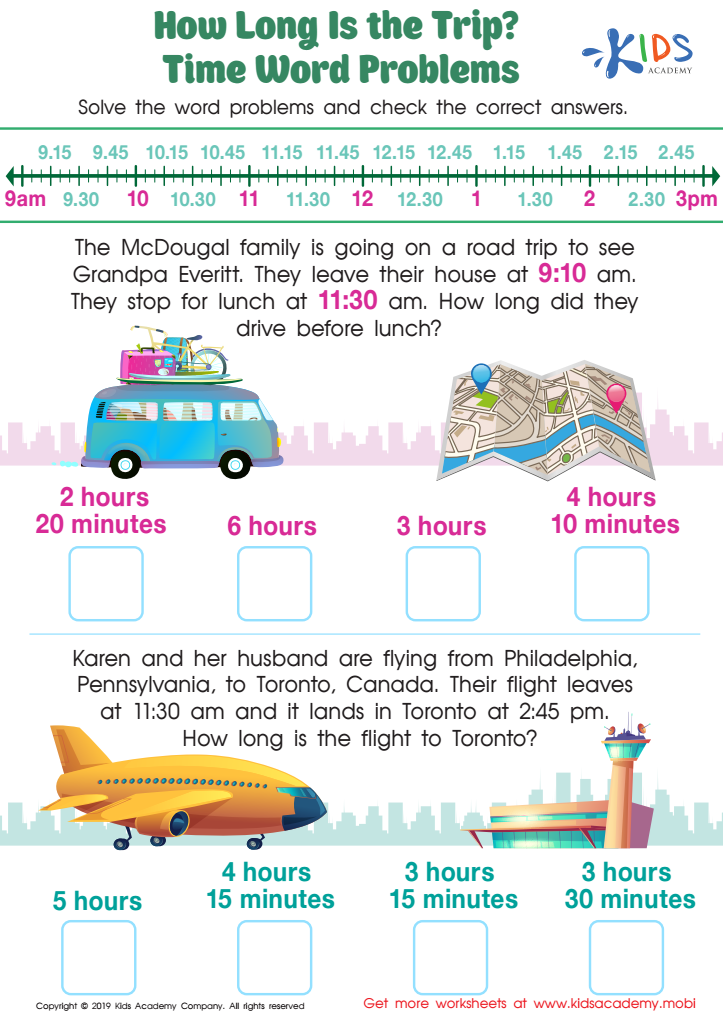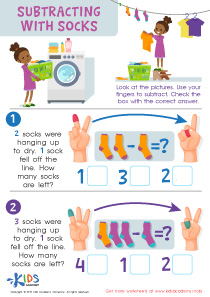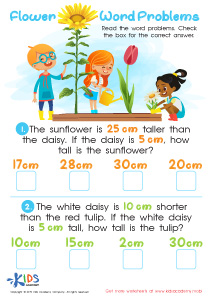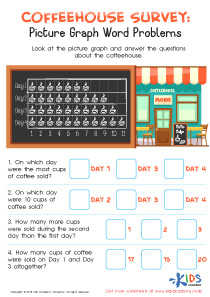Easy Time Word Problems Worksheets for 9-Year-Olds
1 filtered results
-
From - To
Introducing our "Easy Time Word Problems" worksheets, expertly designed for children aged nine. These educational homework sheets are crafted to enhance your child's understanding of time management and problem-solving skills through engaging, age-appropriate challenges. Each worksheet combines clear instructions with fun scenarios that relate directly to everyday life, making learning both enjoyable and relevant. This tool is perfect for parents and teachers aiming to boost mathematical confidence and proficiency in young learners. Encourage your child to master the concept of time with our well-structured and interactive word problems, setting a solid foundation for future academic success.


How long is the Trip? Time Word Problems Worksheet
Why Easy Worksheets on Time Word Problems Are Useful for Nine-Year-Olds
Time management and understanding are crucial life skills, and introducing these concepts early in a child's education can greatly assist in their cognitive and academic development. School worksheets, particularly those focusing on time word problems, are invaluable tools in this learning process. Specifically designed for children around nine years old, these worksheets offer a unique blend of challenge and engagement, helping young students grasp the practical and theoretical aspects of time.
At the age of nine, children are at a pivotal stage in their educational journey. They have moved past the basics of reading clocks and are now ready to apply their knowledge to more complex scenarios. Easy worksheets on time word problems come into play here, serving as an excellent resource for teachers and parents aiming to strengthen a child’s math and reasoning skills.
Fostering Mathematical Skills
Mathematics is not just about numbers; it involves understanding patterns, logical reasoning, and problem solving, which are all integral to solving time word problems. These school worksheets provide age-appropriate challenges that encourage children to apply their mathematical skills in a context that is both relatable and practical. For instance, problems may ask a child to calculate the duration of an event or to determine the end time of a movie. This helps solidify their understanding of addition and subtraction within the framework of time.
Enhancing Real-World Application
One of the most significant benefits of time word problems is their ability to bridge classroom learning with real-world application. Through these school worksheets, children learn that time management is not just a subject in school but a daily life skill. They encounter scenarios that mimic real-life situations, such as figuring out how long a homework session should last or planning how much TV time they can have after completing their chores. This relevance to everyday activities makes learning more engaging and meaningful.
Building Critical Thinking and Reasoning
Time word problems require more than just mathematical skills; they also demand critical thinking and reasoning. Children must read the problem, understand what is being asked, and decide on the method to find the correct answer. This process enhances their ability to comprehend and analyze situations, skills that are valuable in all areas of learning and life.
Supporting Academic Independence
As children work through easy time word problems on school worksheets, they gradually build confidence in their problem-solving abilities. This confidence fosters academic independence as they learn to tackle questions and solve problems on their own. For nine-year-olds, developing a sense of independence is essential as they prepare for more challenging subjects and higher grades. School worksheets designed with the right level of complexity encourage this growth, allowing students to experience success and motivation to learn more independently.
Encouraging Consistent Practice
Practice makes perfect, and this is particularly true when learning complex concepts like time management. Regularly working on time word problems through school worksheets ensures that children consistently apply what they’ve learned. This repetition not only reinforces their mathematical skills but also helps them retain information better and understand the concept of time more deeply.
Promoting Collaborative Learning
Easy worksheets on time word problems can also be a source of collaborative learning. Teachers and parents can encourage children to work in pairs or groups to solve problems together. This peer interaction enhances communicative skills and allows children to see different methods of solving the same problem. It can be an enlightening experience that promotes teamwork and empathy, as students share strategies and help each other understand various approaches to finding solutions.
Customizable Learning Tools
Another advantage of using school worksheets for teaching time word problems is their adaptability. Educators and parents can choose or create worksheets that specifically target the needs and learning pace of their children. Whether it’s increasing complexity, focusing on particular types of time calculations, or integrating them with other subjects such as geography or history, these worksheets can be tailored to enhance the learning experience and keep it relevant.
Conclusion
In conclusion, easy worksheets on time word problems are immensely useful for nine-year-olds. They not only strengthen a child’s mathematical and reasoning skills but also teach them about the practical application of these skills in everyday life. Additionally, these worksheets foster critical thinking, build academic independence, encourage consistent practice, promote collaborative learning, and can be customized to fit educational needs. For educators and parents looking to enhance their children’s understanding of time and prepare them for future challenges, incorporating these worksheets into their learning routine is a wise and beneficial strategy.
 Assign to My Students
Assign to My Students







.jpg)






